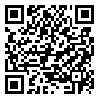Sat, Apr 20, 2024
[Archive]
Volume 14, Issue 2 (6-2022)
2022, 14(2): 32-40 |
Back to browse issues page
Download citation:
BibTeX | RIS | EndNote | Medlars | ProCite | Reference Manager | RefWorks
Send citation to:



BibTeX | RIS | EndNote | Medlars | ProCite | Reference Manager | RefWorks
Send citation to:
Kashefi Gargari S, Keyvanpour M R. Comparative Analytical Survey on SBST Challenges from the Perspective of the Test Techniques. International Journal of Information and Communication Technology Research 2022; 14 (2) :32-40
URL: http://ijict.itrc.ac.ir/article-1-499-en.html
URL: http://ijict.itrc.ac.ir/article-1-499-en.html
1- Department of Computer Engineering Faculty of Engineering Alzahra University Tehran, Iran
2- Department of Computer Engineering Faculty of Engineering Alzahra University Tehran, Iran , keyvanpour@alzahra.ac.ir
2- Department of Computer Engineering Faculty of Engineering Alzahra University Tehran, Iran , keyvanpour@alzahra.ac.ir
Abstract: (1195 Views)
Despite several decades of working on software quality assurance methods, they still require further investigation. It is paramount to detect a process detecting possible software errors with a minimum budget and effort. Search-based software testing (SBST) is an approach to automated software testing that aims to find a suitable alternative to manual testing. The SBST is to transform the test problem into an optimization problem and obtain better solutions by searching the problem space. Search-based testing has some disadvantages and advantages. The novelty of this paper is that, besides representing the significance and efficiency of SBST in software testing, the search-based test challenges were detected and described from the perspective of the test techniques. Our work is to extract challenges from reliable sources and research and their classification based on test techniques. For this purpose, we considered this framework: 1) A systematic introduction to the most critical metaheuristic optimization algorithms. 2) classifying the test techniques and explaining their advantages and disadvantages. 3) proposing a suitable classification for the challenges of the search-based test area based on the technique used. Our motivation to do this research was to provide complete knowledge about search-based software testing challenges so that new researchers could choose their research fields with prior knowledge and provide a way to improve existing methods. Finally, the results of this paper can be used to compare the existing test techniques used in SBST, select the best one, and represent the challenges of each technique.
References
1. S. Ul Haq and U. Qamar, "Ontology Based Test Case Generation for Black Box Testing," in Proceedings of the 2019 8th International Conference on Educational and Information Technology, 2019: ACM, pp. 236-241.
2. [2] A. P. Mathur, Foundations of Software Testing: Fundamental Algorithms and Techniques. Pearson Education, 2008.
3. [3] P. McMinn, "Search‐based software test data generation: a survey," Software testing, Verification and reliability, vol. 14, no. 2, pp. 105-156, 2004.
4. [4] M. R. Keyvanpour, H. Homayouni, and H. Shirazee, "Automatic software test case generation: An analytical classification framework," International Journal of Software Engineering and Its Applications, vol. 6, no. 4, pp. 1-16, 2012.
5. [5] A. M. Bidgoli, H. Haghighi, T. Z. Nasab, and H. Sabouri, "Using swarm intelligence to generate test data for covering prime paths," in International Conference on Fundamentals of Software Engineering, 2017: Springer, pp. 132-147.
6. [6] G. Candea and P. Godefroid, "Automated software test generation: some challenges, solutions, and recent advances," in Computing and Software Science: Springer, 2019, pp. 505-531.
7. [7] S. U. Farooq and S. Quadri, "Identifying some problems with selection of software testing techniques," Oriental Journal of Computer Science & Technology, vol. 3, no. 2, pp. 266-269, 2010.
8. [8] A. Bertolino, "Software testing research: Achievements, challenges, dreams," in 2007 Future of Software Engineering, 2007: IEEE Computer Society, pp. 85-103.
9. [9] K. Ghani and J. A. Clark, "Automatic test data generation for multiple condition and MCDC coverage," in 2009 Fourth International Conference on Software Engineering Advances, 2009: IEEE, pp. 152-157.
10. [10] M. Harman and B. F. Jones, "Search-based software engineering," Information and software Technology, vol. 43, no. 14, pp. 833-839, 2001.
11. [11] M. Harman, Y. Jia, and Y. Zhang, "Achievements, open problems and challenges for search based software testing," in 2015 IEEE 8th International Conference on Software Testing, Verification and Validation (ICST), 2015: IEEE, pp. 1-12.
12. [12] A. Arcuri and J. P. Galeotti, "Enhancing search-based testing with testability transformations for existing APIs," ACM Transactions on Software Engineering and Methodology (TOSEM), vol. 31, no. 1, pp. 1-34, 2021.
13. [13] A. Aleti, "On the Effectiveness of SBSE Techniques," in International Symposium on Search Based Software Engineering, 2021: Springer, pp. 3-6.
14. [14] S. Varshney and M. Mehrotra, "Search based software test data generation for structural testing: a perspective," ACM SIGSOFT Software Engineering Notes, vol. 38, no. 4, pp. 1-6, 2013.
15. [15] C. Mao, X. Yu, J. Chen, and J. Chen, "Generating test data for structural testing based on ant colony optimization," in 2012 12th International Conference on Quality Software, 2012: IEEE, pp. 98-101.
Send email to the article author
| Rights and permissions | |
 | This work is licensed under a Creative Commons Attribution-NonCommercial 4.0 International License. |





